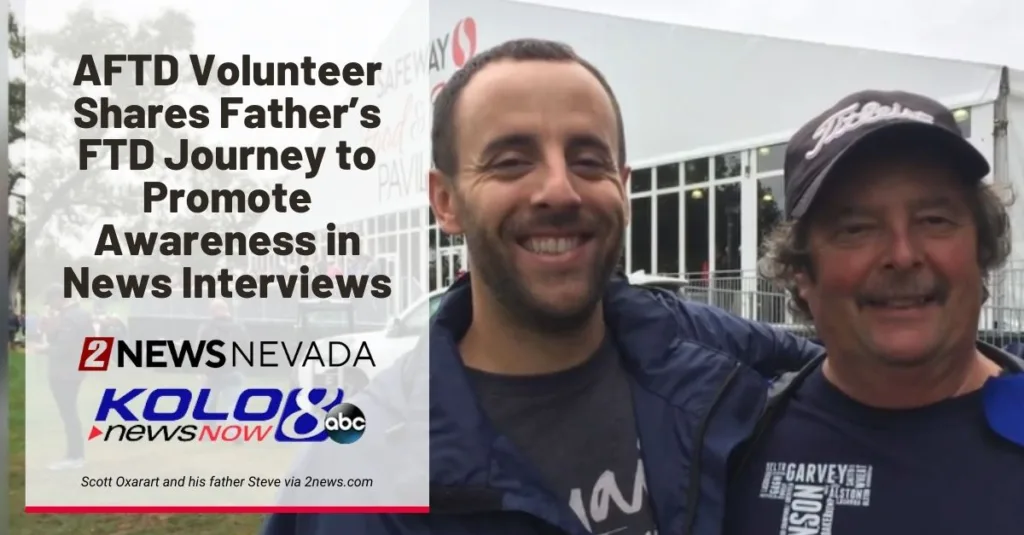AFTD Volunteer Shares Father’s FTD Journey to Promote Awareness in News Interviews

AFTD volunteer Scott Oxarart raised awareness of FTD throughout Nevada in interviews aired by 2 News Nevada and KOLO News Now on February 13 and 14. A former care partner for his late father, Steve, Oxarart shared experiences from his family’s FTD journey.
Oxarart told 2 News reporter Jaden Urban that he and his father had a close relationship, noting that Steve was “always there – he was at all my games; I could tell him anything.”
“My dad was awesome,” Oxarart told KOLO reporter Nick Doyle. “He was a great father and a great husband. He loved Wolf Pack football. He loved barbecuing. He loved going on trips, camping, [being] outdoors. He was a great person to be around, and his friends and family loved him.”
The first signs that something was wrong came in 2018, with subtle changes in Steve’s behavior and decision-making, Oxarart said. Over time, Steve had increasing difficulty with impulse control, sometimes eating an entire box of cookies in a single sitting.
Later, Steve began having delusions. “He was even sadly telling my mom, like, ‘Hey, I’m going to go on a date with a girl,’ which wasn’t true,” Oxarart told Urban. “He wasn’t going anywhere.”
Oxarart also told Urban about a time when Steve called 911, reporting a dead body in his bedroom.
“[The] SWAT team came and came guns blazing, ready to look for a murderer – and they got into the room, and there was no one in there,” Oxarart said.
Steve was finally diagnosed with FTD in 2021.
AFTD CEO Susan L-J Dickinson, MSGC, provided some context on FTD for the 2 News report, telling Urban that those living with FTD “lose language [and] their ability to control their behaviors or to perform the executive tasks that a lot of us do each day.”
In his interview with Doyle, Oxarart characterized the disease as something that “transforms what once was a very intelligent, normal person living a great life, and it turns them into someone who can be delusional and can have severe cognitive impairment and really turn them into somebody who is absolutely not what they used to be.”
Oxarart told Urban that he and his mother had to constantly remind themselves that it wasn’t Steve saying and doing these uncharacteristic things; it was the FTD.
As his FTD progressed, Steve began to have difficulty swallowing. He died last August 7, surrounded by family and friends. Even though his father’s FTD journey has ended, Oxarart, like many who have dealt with this disease, is still grieving.
“[His] grandkids are growing up, you know,” Oxarart told Urban. “All the adventures he could’ve taken his wife on, and his other families, and he just doesn’t get to do it. That’s the hardest part to process.”
Misdiagnosis in FTD is common because of the varied symptoms of the disease, many of which overlap with other psychiatric and neurological disorders. If you have questions or concerns about FTD or its symptoms, the AFTD HelpLine has the answers you need. Contact the HelpLine at 1-866-507-7222 or info@theaftd.org.
Are you interested in raising awareness of FTD like Scott Oxarart? Volunteering with AFTD gives you the chance to raise awareness and educate others about FTD. You can also join efforts to advocate for legislation supporting FTD research and support by heading to AFTD’s Advocacy Action Center.
By Category
Our Newsletters
Stay Informed
Sign up now and stay on top of the latest with our newsletter, event alerts, and more…

